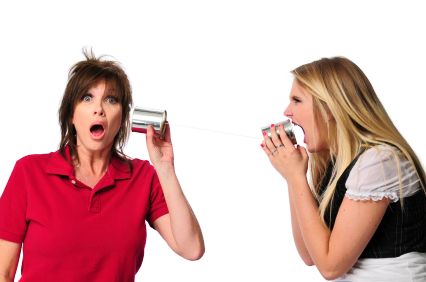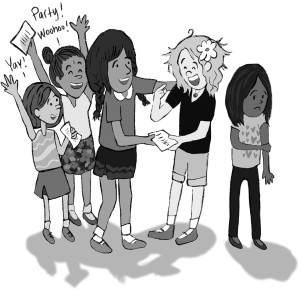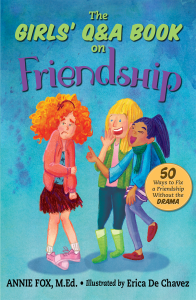|
|
February 7, 2016
Hey Terra!
I’ve been experiencing some moral differences with my parents. I’ve always idolized my them, but recently, I’ve realized I simply can’t agree with some of their ideas.
On a recent trip we took public transportation and most of the people riding with us were African Americans. My mom kept whispering derogatory racist remarks to me and my sister. And just a few days ago, my mom argued that a person’s skin color and other aspects of appearance are a direct link to the quality of the person.
I love my parents, but it makes me confused when I disagree so vehemently with people I care about. Racism is a big issue and I hate to see my parents contribute to it.
How should I respond when they bring up or argue this topic again? Is debating with them a viable solution? – Confused
 Talk to the hand. I am very proud of you for recognizing racist remarks when you hear them and knowing it’s not ok to talk like that. Even if these remarks come from someone you love and idolize (like your parents) a racist comment is still a racist comment! You’re right. Racism is a big issue and you have chosen to be part of the solution, not the problem. I admire you for taking that role.
So how should you respond when parents try to argue their ignorant perspective? Great question! To discover the answer you first need to examine the answer to this question: “When it comes to other people’s attitudes, opinions, feelings, thoughts and behavior what power do I have?” You sound like an extremely intelligent individual so you probably don’t need me to tell you that you have no power over what others think or feel or do. Zero. But you do have 100% control over your own behavior.
Because you are uncomfortable with hate speech, you can simply hold up your hand and say to your parents, “Stop. I don’t want to hear this kind of talk.” You can do that with conviction, but without rudeness or anger. You have the right to respectfully set boundaries for their hate speech in your space. Will this change your parents’ attitudes about people who are different from themselves? Not likely, but at least they will know it is not OK with you to speak this way in front of you.
Your thoughts?
In friendship,
Terra
Hi Terra,
I’m so grateful to know there is a reasonable way to stop these conversations when they start without adding fuel to the fire. Thanks again! – Less Confused
Glad to help.

January 8, 2016
 Hearing isn’t the same as listening Parents of teens have one of the roughest jobs. The dynamic between you and your son/daughter is changing so quickly it can be challenging to stay focused on your job description. It was easier when the kids were younger and you could pick them up, if you needed to, and get them out of harm’s way. With teens, it’s not always clear what your job is or how to do it.
There’s no single golden rulebook for parenting (though I’ve written a good one and so have lots of other people in the know), but these 10 tips can help you stay centered. And that’s exactly where you need to be if you want to be an effective parent and role model for your adolescent kids.
- Remember that you are the parent — Your job is to protect your child and prepare him/her to become a fully functioning adult. Being a leader and a compassionate teacher is more important than being your teen’s friend.
- Remain calm — Nothing gets resolved when stress makes it impossible to think clearly. Can’t respond rationally? Then take a break until you can.
- Talk less and listen more — Just like the rest of us, teens want to be respected and heard. Be a “safe” and available person to talk to.
- It’s a balancing act — A key challenge in parenting teens is to remain emotionally connected while granting your kids more privacy and autonomy.
- They’re always watching – Want your teen to be trustworthy, responsible, and compassionate? Make sure you’re modeling those values in your own life.
- Make your expectations clear and be consistent with your follow-through— If kids know the consequences ahead of time and they’ve bought into the rules of the house, they’re more likely to make healthy choices.
- Catch your teen in the act of doing something right — Praise shows that you noticed their efforts. It also promotes a feeling of competency.
- Be real — Father/mother does NOT always know best. Admit your own confusion and mistakes. Apologize when appropriate. Show your kids that just like them, you too are also “a work in progress.”
- Regularly create time to enjoy being a family — Having regular meals together and relaxing, unplugged from digital technology, is a gift with long-lasting benefits.
- Lighten up! — Humor is a great de-stressor. Remember, no one stays a teen (or the parent of a teen) forever!
If you’ve got other tips for parenting tweens and teens, I’d love to hear from you.

October 22, 2015
 I’m a bad ass. Just for tonight. Around here we’re experiencing a black and orange explosion. Each year the Halloween house make-overs get more impressive.
We’ve still got nine days to go, so I thought I’d get ahead of the curve and write about Halloween’s teachable moments for kids. Non-spoiler alert: This is not a parent tip sheet on how to put reasonable restrictions on kids’ sugar consumption. (That’s not a bad idea, but I leave it to the nutritionists.) Instead, let’s talk about the “mask” kids put on for Halloween vs. the mask many of our tweens and teens wear every single day. Halloween is a time to pretend to be someone else. It can be great fun and I’m a huge fan. But what happens when your child wears a mask all the time, hiding who he or she really is because of fear of disapproval from peers or even from you?
I’ve been thinking about the fine art of faking it for a long time because I work with tweens and teens and, face it, they can be masters of deception. When I talk to kids about consciously putting on a “mask,” as we do when we get up on stage to perform in a play or dress up to explore other identities, it fits right into the idea of figuring out who you are, which is the manifesto of adolescence. But when we get so attached to hiding behind the mask that we’re no longer conscious of wearing it then we are faking it without knowing it. That’s never a good place to be, especially at a time when our tweens and teens ought to be exploring what it means to be one’s authentic self.
I have asked kids: How do you know when you’re faking it? They’ve provided profound responses, like these:
I get a sinking feeling in my stomach.
I feel like what I’m doing is not really me, but I continue doing it anyway.
I feel like a fraud in my own body.
I feel like a jumble of very confused spaghetti.
We ought to encourage our kids to reflect deeply on who they are and who they are becoming. They need to think clearly, despite the cacophony of judgments and opinions happening around them and within them. The best way I know to do that is by telling them how much we appreciate who they are when they are being authentic. We need to also model authenticity in own our lives. That doesn’t mean that we are always a certain way. Our behavior and attitudes change depending on circumstance and setting, and that’s appropriate. But when it’s “just us,” in the family, we need to create opportunities to talk about what it means to be true to oneself and to have integrity. No faking it.

December 20, 2014
T’is the season for parties. When it’s a family affair, all the kids are included. But as you get older, you may want to organize your own get-togethers, and that means only “special friends” get invited. If you’ve been left off a party invitation list you might have felt left-out. But what if you were invited to a party and one of your besties wasn’t? Awkward situation!
This question comes from a girl who found herself in that situation. Her question and my answer are included in my latest book, The Girls’ Q&A Book on Friendship: 50 Ways to Fix a Friendship Without the DRAMA. Read on…
 “I got invited, but my friend didn’t! Awkward!”
Q: “Friend A invited everyone to her party except Friend B. Now Friend B is mad at me for wanting to go. But I need to go so I can be popular. Is it worth it?”
Answer: If understand that you want to go to the party, but if everyone was invited except Friend B, you can understand why she is upset. Maybe you can also understand why she is angry that you want to go without her.
When you say, “I need to go to the party so I can be popular,” I wonder if the Popularity Game means more to you than Friend B. People who ditch friends to be with more “popular” people often find themselves without any real friends.
Should you go to the party? Good question! If you do, then Friend B will probably be unhappy with you. She might get over it, but there is also a chance that your going to the party could really damage the friendship. You are the only one who can decide if it’s “worth the risk. To help you figure it out, think about this: If Friend B go invited and you didn’t, how would you feel about her going with you? If it wouldn’t feel right for her to go, then it’s probably not right for you.
_______
If you’re curious about the 49 other questions and answers in The Girls Q&A Book on Friendship, check out this free excerpt. If you’ve got a friendship challenge you need help with right now, email me or post it to the comments below.
 50 Ways to Fix a Friendship without the DRAMA
 — Older Posts »
| |
















“My parents are racist!”
February 7, 2016
Talk to the hand.
I am very proud of you for recognizing racist remarks when you hear them and knowing it’s not ok to talk like that. Even if these remarks come from someone you love and idolize (like your parents) a racist comment is still a racist comment! You’re right. Racism is a big issue and you have chosen to be part of the solution, not the problem. I admire you for taking that role.
So how should you respond when parents try to argue their ignorant perspective? Great question! To discover the answer you first need to examine the answer to this question: “When it comes to other people’s attitudes, opinions, feelings, thoughts and behavior what power do I have?” You sound like an extremely intelligent individual so you probably don’t need me to tell you that you have no power over what others think or feel or do. Zero. But you do have 100% control over your own behavior.
Because you are uncomfortable with hate speech, you can simply hold up your hand and say to your parents, “Stop. I don’t want to hear this kind of talk.” You can do that with conviction, but without rudeness or anger. You have the right to respectfully set boundaries for their hate speech in your space. Will this change your parents’ attitudes about people who are different from themselves? Not likely, but at least they will know it is not OK with you to speak this way in front of you.
Your thoughts?
In friendship,
Terra
Glad to help.